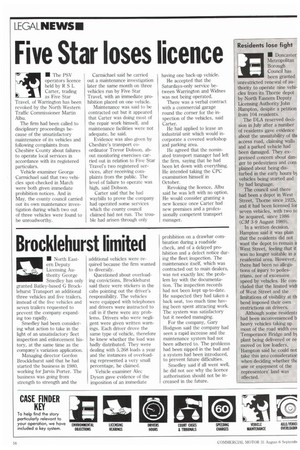Brocklehurst limited
Page 18

If you've noticed an error in this article please click here to report it so we can fix it.
• North Eastern Deputy Licensing Authority George Smedley has only granted Batley-based G Brocklehurst Transport an additional three vehicles and five trailers, instead of the five vehicles and seven trailers requested to prevent the company expanding too rapidly.
Smedley had been considering what action to take in the light of an unsatisfactory fleet inspection and enforcement history, at the same time as the company's variation application.
Managing director Gordon Brocklehurst said that he had started the business in 1980, working for Jarvis Porter. The business was going from strength to strength and the additional vehicles were required because the firm wanted to diversify.
Questioned about overloading convictions, Brocklehurst said there were stickers in the cabs pointing out the driver's responsibility. The vehicles were equipped with telephones and drivers were instructed to call in if there were any problems. Drivers who were negligent were given written warnings. Each driver drove the same type of vehicle, therefore he knew whether the load was badly distributed. They were dealing with 5,268 loads a year and the instances of overloading represented a very small percentage, he claimed.
Vehicle examiner Alec Dyson gave evidence of the imposition of an immediate prohibition on a drawbar combination during a roadside check, and of a delayed prohibition and a defect notice during the fleet inspection. The maintenance itself, which was contracted out to main dealers, was not exactly lax; the problem lay with the documentation. The inspection records had not been kept up-to-date. He suspected they had taken a back seat, too much time having been spent attracting work. The system was satisfactory but it needed managing.
For the company, Gary Hodgson said the company had seen a rapid increase and the maintenance system had not been adhered to. The problems had been nipped in the bud and a system had been introduced, to prevent future difficulties.
Smedley said if all went well, he did not see why the licence authorisation should not be increased in the future.
































































































































